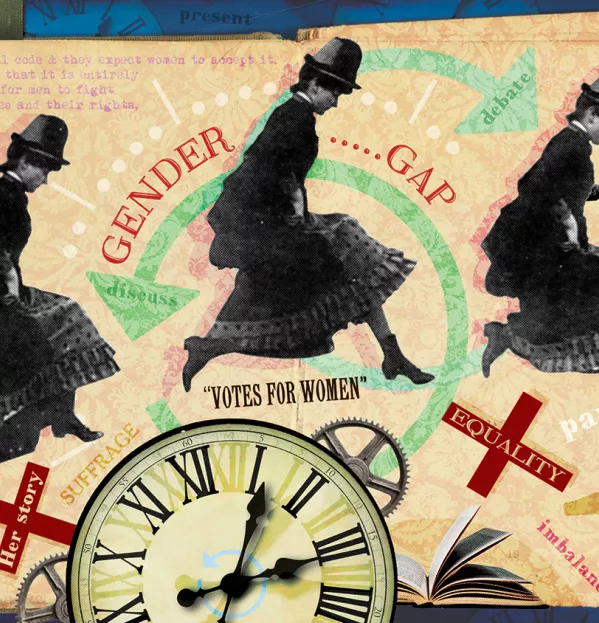We’ve come a long way, but we’ve still work to do

Every week, my students discuss news stories that underline how we are calling out sexism in our everyday lives far more than we used to. For example, there was widespread media coverage of Equal Pay Day - which fell on 10 November in 2017 - which draws attention to the gender pay gap that still exists between men and women’s average salaries.
Data from the World Economic Forum reveals that the equality gap between men and women would take another 100 years to close at its current rate. The report also shows a year-on-year worsening of the gender gap since it began it in 2006. Women are measured as having 68 per cent of the chances and outcomes that men have.
If we are to create a more equal future, teachers need to do more to discuss and debate issues around sex and gender. The question for all of us is not just where we need to go but also how we can accelerate the rate of change.
Despite this, less than three years ago, feminism was recommended for removal from the A-level government and politics syllabus. And it was Nicky Morgan, then education secretary and minister for women’s equality, who oversaw the plans to write feminism out of history.
Like many of my pupils and colleagues, I was appalled at this proposal. By erasing women from the curriculum, you teach boys and girls that women’s work is not important - and that the contributions they make are not as valuable. At a time when less than a third MPs are female, this is a dangerous message. It seemed like another opportunity to silence women’s voices, both past and present.
I was therefore delighted that public pressure resulted in feminism being reinstated in the politics syllabus - and more women being included in the course content. Yet, this scandal taught me that we cannot rely on the government to teach young men and women that every voice is important. Understanding women’s role in history is a powerful force for understanding the present and driving change. For the sake of the men and women of the future, we need to hear more about the women of the past.
Next month is the centenary of the first women achieving the right to a parliamentary vote in Britain. The Fourth Reform Act of 1918 enfranchised women older than 30. July 2018 will mark 90 years since the 1928 Equal Franchise Act, which finally enfranchised all adult women on the same basis as men. It is a moment both to celebrate, but also to reflect.
With such a significant milestone for women’s rights nearly upon us in 2018, the curriculum has a responsibility to create an open dialogue to foster further progress. However, a quick glance at the A-level history curriculum, for example, reveals the majority of exam papers focus on men.
Conference call
This year, I introduced a Women’s History Conference, open to sixth-form students from local schools, to tackle the view that the absence of women’s history in the curriculum is a reflection of women’s minor role in history. Often, the general consensus is that women in the past were so oppressed that they were absent from important historical events.
I reached out to several academics and received an instant and enthusiastic reply from Dr Juliette Pattinson, head of history at the University of Kent. We shared similar views: education on the history of women across all levels is patchy and tokenistic, with the tendency to focus on one or two well-known historical figures. Involving outside academics enabled us to create an environment of debate, involving taster lectures, seminars, workshops and an examination of pioneer texts. All designed to give students at a critical point in their academic career a taster of what historical study has to offer, as well as filling important missing gaps in the curriculum.
We were delighted by the response to the conference, with one student writing, “I walked away feeling energised and motivated to keep the campaign alive. We need to keep fighting for gender equality and it’s my generation that can make the difference.”
Women’s history, sex, and gender needs to be at the forefront of our children’s education. I don’t want someone to be writing in my place in 100 years’ time about a similar need.
As educators, we need to be constantly alive to potential bias within the curriculum. Without radical reform, we need to tackle imbalances through extra-curricular initiatives, such as introducing a feminist society, inviting in external speakers, or organising a women’s conference in collaboration with local universities. It is a wonderful way to engage with women’s history. It can be transformative, a way to understand women’s past experiences and to reflect on women’s position in contemporary society.
Kristina Lewis is head of history, government and politics at Bromley High School GDST
You need a Tes subscription to read this article
Subscribe now to read this article and get other subscriber-only content:
- Unlimited access to all Tes magazine content
- Exclusive subscriber-only stories
- Award-winning email newsletters
Already a subscriber? Log in
You need a subscription to read this article
Subscribe now to read this article and get other subscriber-only content, including:
- Unlimited access to all Tes magazine content
- Exclusive subscriber-only stories
- Award-winning email newsletters